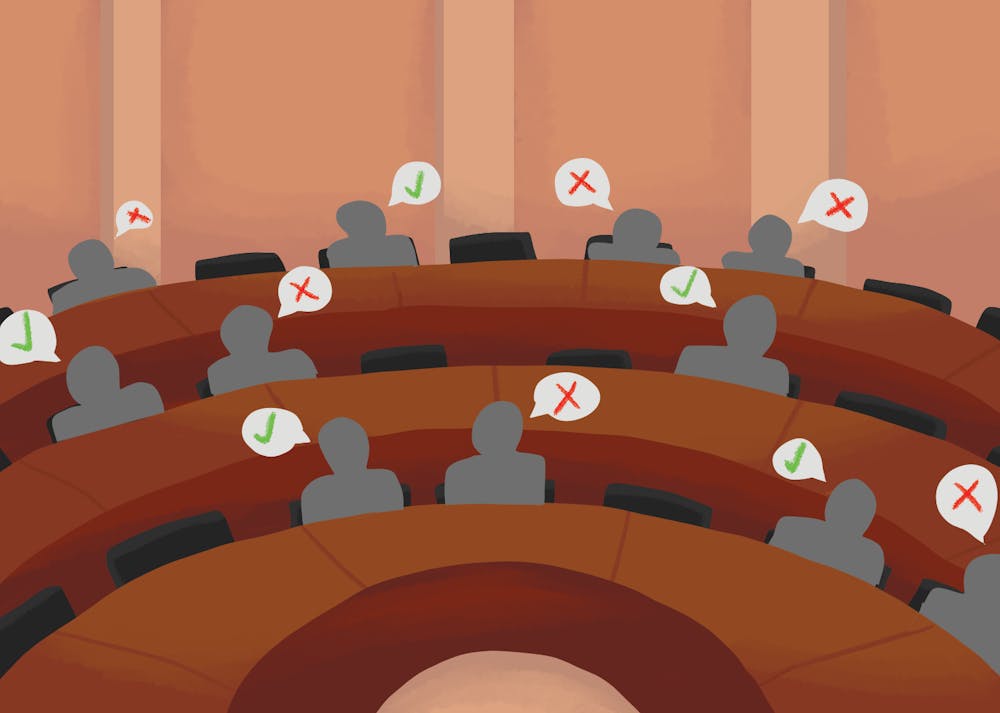Undergraduate Student Government is operating with vacancies in the Senate after struggling to find candidates to run for office during last semester's elections.
Last semester, 28 USG Senate seats were left vacant across all four campuses at the end of USG elections – three for USG Tempe, eight for USG Downtown, six for USG West and 11 for USG Polytechnic. Those numbers increased over the summer with four USGT elected senators leaving, bringing the total to 32 vacancies at the start of the fall semester.
Marco Huerta, the senate president for USGT and a senior studying political science, said seats tend to open up over the summer as newly elected senators realize the commitments of serving.
"Senators are asked to keep their Tuesday nights clear because we have our second sessions every other Tuesday at 6 p.m., and if they're scheduled for a class Tuesdays at that hour, then they can't attend the Senate session (and) they can't, therefore, represent their college as we conduct our business," Huerta said.
USGD has changed their meeting time from Friday to Tuesday afternoons in order to make their meetings more accessible to senators and encourage students to apply for vacancies, according to Dane Van Wagenen, the USGD senate president and a sophomore studying medical studies.
Until vacancies are filled, the Senate will only count the number of filled seats when considering Senate rules in order to ensure business can still be done, Huerta said.
According to USG bylaws, vacant Senate seats at the beginning of an academic year can be filled by a college council nomination instead of by an election. Interested candidates are only required to submit an application and interview with college councils and other USG leaders in order to be nominated.
For smaller campuses like West, Senate vacancies can go an entire year without being filled, said Elizabeth Chilton, USGW President.
"We typically go most of the year with a few vacancies that we try to fill as often as possible," said Chilton, a junior studying business. "However, we're hoping that we'll see less of that this year because there's going to be so many people wanting to participate and get that college experience."
The Senate can still operate with these vacant seats, according to Chilton, but colleges with vacancies have less representation since no, or fewer, senators are able to meet with the college's dean to address specific issues.
USG has historically faced vacancies following elections. After 2020's misallocation of seats and mishandled executive race, there were 23 vacancies left after elections had finally ended at the end of May, a month into summer. In 2019, vacancies across all four campuses plagued multiple colleges.
Less politically active colleges like the Herberger Institute for Design and the Arts and the Mary Lou Fulton Teachers College struggle with finding candidates.
Huerta attributes this to the lack of campus awareness surrounding USG and what the organization does.
"We as student government need to expand our presence on campus and make sure students know exactly what our mission is, what we do with certain dollars and items such as that," Huerta said.
Chilton said the Council of Presidents is discussing ways to educate students on USG and make them more aware of elections and deadlines to apply for candidacy.
"Someone might be interested in getting involved in USG, but they might not know that they have to run in those elections in the spring to be able to fill the position," Chilton said.
In the previous years with vacancies, USG leaders offered the same solutions to recruit more people to USG. Despite that, the vacancies continue.
Despite the high vacancy numbers, Chilton, Huerta and Van Wagenen are confident they will be able to fill seats through recruitment. They're hoping to capitalize on the return to in-person events and classes when promoting elections and the mission of USG.
"Everyone's goal of joining USG and what they want to accomplish this year revolves around bringing back that student experience that was so missed last year," Van Wagenen said.
Reach the reporter at rpriest2@asu.edu and follow @reaganspriest on Twitter.
Like The State Press on Facebook and follow @statepress on Twitter.
Continue supporting student journalism and donate to The State Press today.

Reagan Priest is a managing editor, overseeing and working with the six digital desks at The State Press. She previously worked as a social justice reporter for Cronkite News and as a digital production intern at The Arizona Republic.




